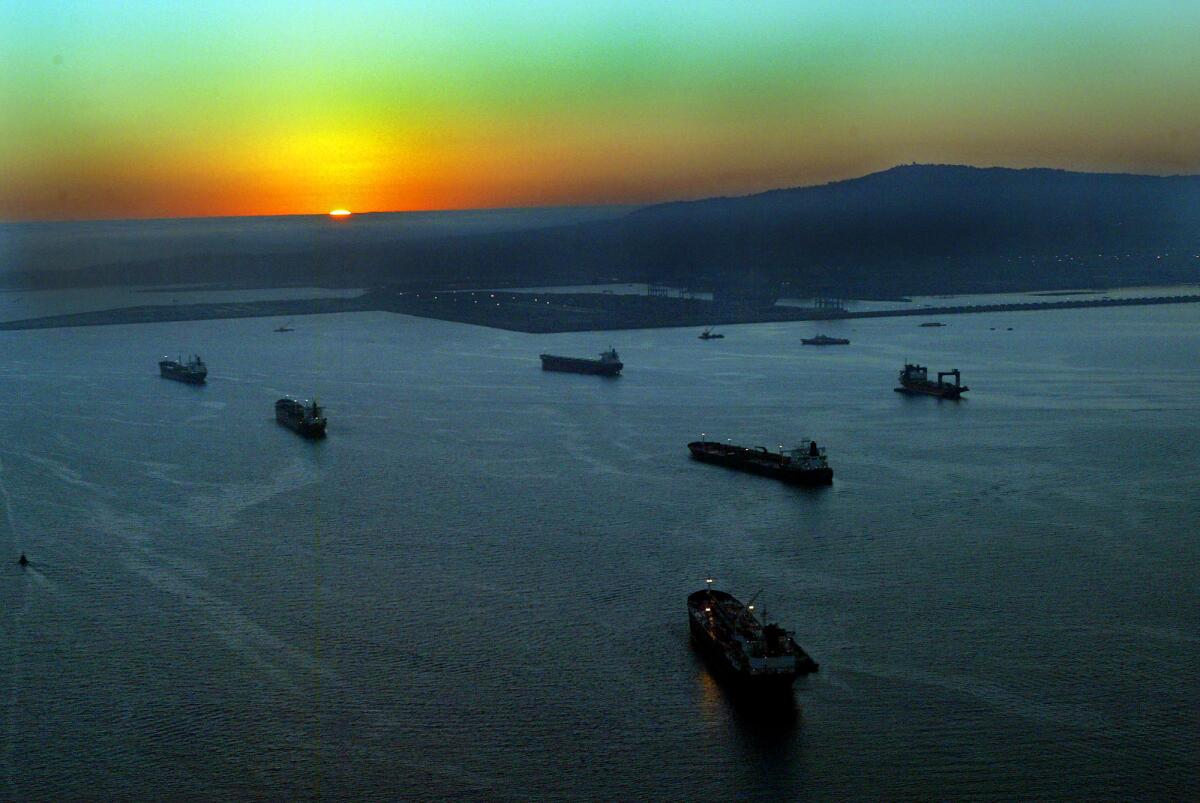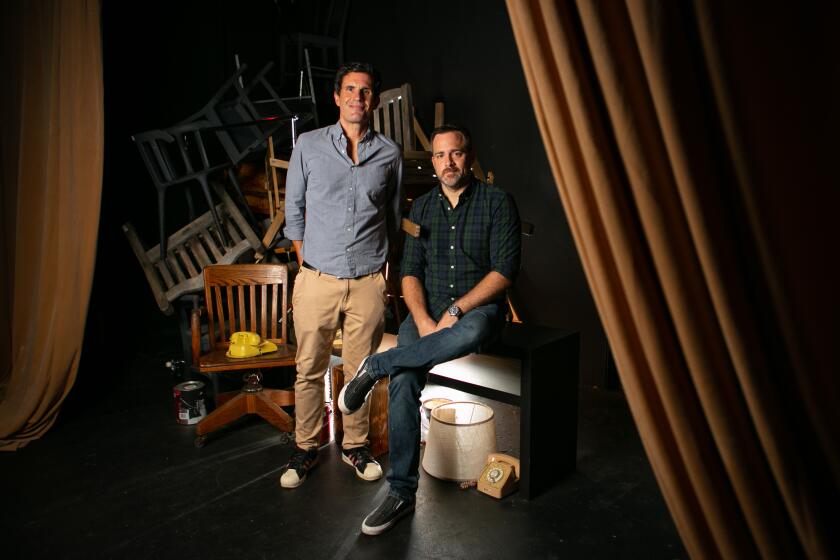L.A. Opera set gets stuck at the port, so crews will build a new one — in just 10 days
- Share via
Four shipping containers transporting the sets of Los Angeles Opera’s season opener, “Il Trovatore,” have been circling the Port of Los Angeles since Aug. 10 — victims of coronavirus disruptions to the global supply chain that have created bottlenecks at many of the world’s busiest seaports.
As of Monday, 38 container ships were anchored off the ports of Los Angeles and Long Beach, according to the Marine Exchange of Southern California. The 40-foot containers specific to L.A. Opera — shipped from Opera de Monte-Carlo in Monaco — may not reach dry ground until Sept. 7 or 8, representatives for L.A. Opera said. By the time the set components inside are unloaded, getting them erected for opening night Sept. 18 will be nearly impossible.
Failure is not an option, however. Not after the delicate ups and crushing downs of the pandemic, which forced L.A. Opera off the Dorothy Chandler Pavilion stage and resulted in losses estimated at more than $31 million in earned and contributed revenue.
The company said Tuesday it will build its own set — condensing a process that would normally take at least three months into a mad rush of just 10 days. Technical director Jeff Kleeman and vice president of artistic planning Rupert Hemmings are spearheading the project, launching a crew of about 45 on cutting wood, gluing, stapling, sanding, painting, building 60-foot-long video trusses and assembling the manifold systems and propane supplies needed for flame effects. The crew is expected to work from 8 a.m. to 10 p.m. daily to get the job done.

The news from the port first reached L.A. Opera late Friday. The company had been on track for its highly anticipated return to the Dorothy Chandler after more than 18 months of pandemic shutdown.
“Well, of course that happened, of course it did,” Kleeman recalled thinking of the shipping delay. “It took me a while to settle into the reality that this is what we’re dealing with. It felt like a dream.”
The first order of business, Kleeman said, was materials acquisition. “They are rare and expensive, and hard to come by right now,” said Kleeman, who nonetheless secured $35,000 of raw lumber. The first shipment arrived Monday, the second Tuesday.
Construction starts in the basement, and then pieces of the set are spread outside for painting. After that, they will be erected on the stage.
All the while, the electric department will be hanging nearly 1,000 lighting fixtures according to the original plan. Fortunately, the company has the costumes and props, which came months ago by air.
The work is happening simultaneously because in two weeks, the large cast needs to be onstage rehearsing — just as L.A. Opera planned a year ago when the company announced a September 2021 reopening.
Hemmings estimated that this massive pandemic pivot will cost an additional $300,000, but he said it’s well worth it.
“It’s important for us to proceed because all of our artisans and chorus members have been out of work for so long that we are committed to spending the money and getting back to work,” he said, adding that everything — from building the set to rehearsing the show to bringing audiences back is made more complex by layer-upon-layer of COVID-19 mitigation strategies.
A mandatory vaccination policy is in place for all employees, and a comprehensive testing policy is supported by a COVID-19 compliance company.
Yo-Yo Ma reprises his Bach marathon, the Ojai festival returns at long last and San Diego gathers at the new Rady Shell. Let the season begin.
So how does a team — even a highly seasoned team such as this — pull off this operatic hail Mary in 10 days? Well, Kleeman and Hemmings said, the set doesn’t have to last 80 days. It just needs to last for six performances. Corners can be cut when durability isn’t an issue.
“But I’m confident on opening night it will take an extremely discerning audience member to notice the difference,” said Hemmings, who has been in midnight calls with artistic leaders in Monaco, going over the details of the L.A. Opera plan and making sure it aligns with their creative vision. The designer, Louis Désiré, is particularly concerned with texture and paint appearance, so L.A. Opera will be express-shipping samples so he can have the tactile experience. They are also meeting director Francisco Negrín and lighting designer Bruno Poet over Zoom.
This is not an entirely new experience for Kleeman. Twenty years ago a Russian set for “Lady Macbeth” was diverted from L.A. because of a dock strike. Building that set was not nearly as complicated as the set of “Il Trovatore,” said Kleeman, but the sense of adrenaline is familiar. Hopefully, too, will be the feeling of pride when it’s completed and the first spotlight shines onstage.
Kleeman holds very strong memories from that long-ago moment during “Lady Macbeth.” When the curtain opened, he said, the scent of sugar pine filled the theater.
“We had cut 10,000 board-feet of lumber in 10 days, and you could smell it in the auditorium, it was visceral,” Kleeman said. “I’m looking forward to it. That’s how fast and fresh and huge this is: It comes with its own aroma generator.”
Emergency pandemic grants kept them alive, but now what? With the fall season in flux, theater companies face the prospect of moving or shutting down.
More to Read
The biggest entertainment stories
Get our big stories about Hollywood, film, television, music, arts, culture and more right in your inbox as soon as they publish.
You may occasionally receive promotional content from the Los Angeles Times.












